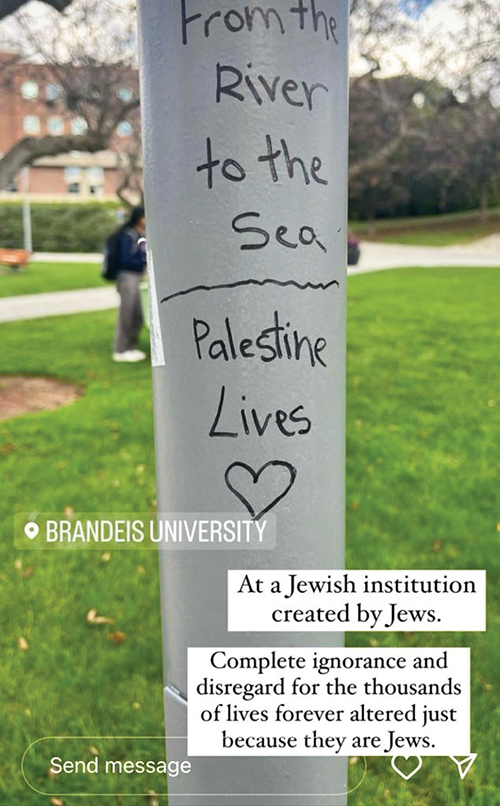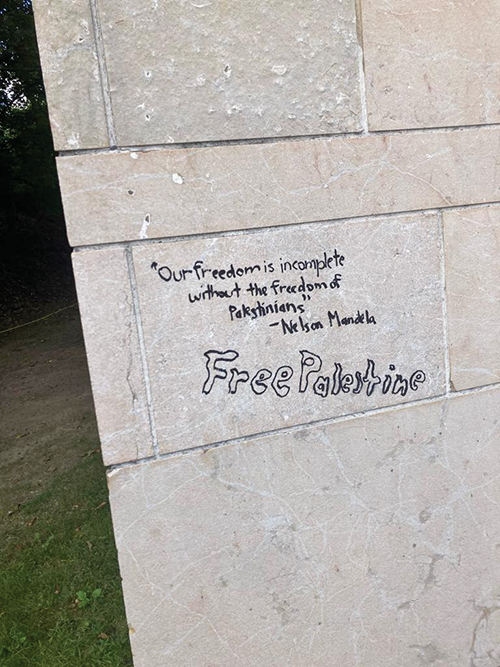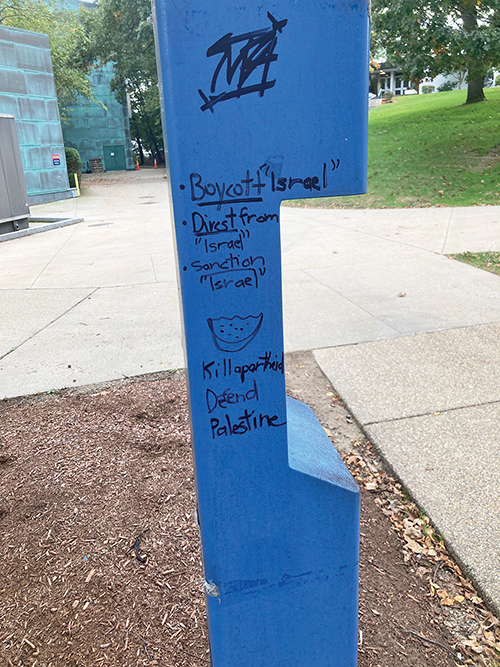On Sunday, October 22, the senators in Brandeis’ Student Union voted against condemning the October 7 massacre orchestrated by Hamas. Does this vote represent the opinion of the student body?

For many of its Jewish students, one of the main draws of Brandeis University’s campus culture is its lack of antisemitism. Although a large portion of its student body and administration leans left politically, a third of Brandeis’ student population is Jewish, the administration is staunchly pro-Israel, and anti-Israel activity on campus is rare, while pro-Israel activity is common. Brandeis has long been considered one of the most pro-Israel secular universities in America.
Brandeis’ President Ron Liebowitz sent several emails to the entire student body in which he strongly condemned the Hamas massacre, with the first being released during the evening of October 7, addressing Jewish students and acknowledging their devastation and condemning Hamas in no uncertain terms, writing, “We condemn in the strongest way terrorism such as we have seen today perpetrated against innocent civilians.” He continued by encouraging students to learn from the large number of faculty and staff on campus with “deep knowledge of the region and the conflict,” and finished by listing resources.
There have been no instances of any pro-Palestinian rallies occurring on campus, nor have there been any public renunciations of Israel on campus. While some students shuttled themselves to nearby Bentley University to join in a pro-Palestine rally, Brandeis students did not feel comfortable enough on campus to express any openly anti-Israel beliefs, instead choosing to hold private Zoom meetings. Jewish students have continued to openly identify themselves as Jewish on campus, and there have been no threats made against anybody. Except for one isolated incident of pro-Palestine graffiti (consisting of messages saying “Free Palestine” on poles that were quickly removed by Brandeis administration), there have not been antisemitic incidents on campus. However, on October 22, Brandeis’ Student Union voted down a resolution condemning Hamas for the October 7 massacre.

Senator Yoni Kahn, a junior at Brandeis, introduced this resolution to the Student Union, classifying it as “supporting Jewish, Israeli, Palestinian and Muslim students,” and continued that, while the resolution clearly condemned Hamas, it made no mention of any actions on behalf of the Israeli government or military. During his presentation to the Student Union members, Kahn explicated, “I stand with the Palestinian cause, but this is about condemning an extremist organization.” However, in a landslide vote, the Student Union voted not to pass the resolution, with six voting to condemn Hamas, 10 voting not to condemn, and five abstaining.
Debbie Engelberg, Brandeis’ international student senator (from Vienna, Austria) and a Jewish Brandeis junior who voted in favor of the resolution, said that student senators argued that the resolution was not apolitical in nature, and that by speaking up against terrorism, Brandeis students were inviting antisemites, particularly Hamas, to put an even larger target on the backs of Brandeis students.
It was reported that many of the senators boldly expressed thinly veiled antisemitic tropes under the guise of criticizing the Israeli government.
The day following the Student Union’s vote, President Liebowitz released a second email, reiterating that Brandeis stands with Israel and that Hamas’ actions were barbaric. “While we are a secular school, we maintain close ties with our founding community and their values,” he said, stating that Israel has the right to defend itself. He also included concern for the situation in Gaza and stressed that Hamas does not represent the Palestinian people as a whole.
Meshulam Ungar, a Brandeis senior who is on the American Jewish Committee campus global board, said that while the Student Union’s original vote was “deeply worrying, and shows the worst of what fellow students can do,” he clarified that he suspected the vote did not truly represent the student body.
Firstly, Ungar pointed out that fewer than 6% of the Brandeis student population even voted in the past student election, so the Student Union “is not fundamentally engaged with campus, and is representing a marginal portion of campus.” (The document that breaks down the votes between candidates also includes the fact that many of the people running for Student Union ran unopposed.)

Shira Stein, a junior at Brandeis, told The Jewish Link that she stopped in the library to correct a student who was making bold claims about the conflict, and within 10 minutes had completely changed his opinion—as he only had one at all after having a brief conversation with his Palestinian friend.
YB, a Muslim Brandeis sophomore who is very involved in Brandeis’ Muslim Student Alliance club (MSA) and describes herself as “very pro-Palestine,” consented to speak to The Jewish Link under the condition of anonymity, due to the tense situation on campus. She said that the Palestinians are trying to “liberate themselves from 75 years of occupation,” and said that she felt like “no one [in the West]” had talked about the Palestinians’ plight until now. She explained that many Muslim students on campus are empathizing deeply with the Palestinians in Gaza and are extremely upset by the war, feeling helpless as they watch things on screens.
Regarding Hamas’ actions, however, YB clarified that while she values human life greatly and “is not happy with killing people,” she noted that “resistance is oftentimes violent,” and described Hamas’ actions as “a byproduct of what happens when you try to liberate yourself from oppression.” She said that her pro-Palestinian stance derives from a humanitarian place, saying that it’s about “standing up for what’s right,” and said that the association with pro-Palestinians and antisemites is “a huge misconception and entirely false.” She defined the term “pro-Palestine” to mean “being on the side of human rights, and acknowledgement of the ills of settler colonialism upon people,” and explicitly denounced the actions of many extremist Islamic groups and clarified her disdain for Muslims “who kill people in the name of Islam and call that jihad.”
However, while YB identified herself as someone who is more mainstream when it comes to how her views on the Israeli-Palestinian conflict fit into the overall atmosphere of MSA, the students in Brandeis’ Students for Justice in Palestine chapter are another matter. Brandeis’ SJP comprises a small handful of members among the university’s student population, and following the beginning of the war, scheduled a private Zoom meeting that was attended by eight individuals, including the speaker. An anonymous student, “Joe,” informed The Jewish Link that, during the meeting, the speaker falsely claimed that Hamas had “only attacked those who were attacking them” and had not targeted any babies, children or elderly (which, obviously, is easily contradicted by Hamas terrorists’ own livestreams of the horrors they committed).
When another student in the Zoom expressed confusion at this “surprising information,” the Zoom host, who self-identifies as Palestinian, clarified that she did “not trust any Israeli or American news sources,” but instead relied on news sources such as the Instagram handle @eye.on.palestine and the notably antisemitic publication Al Jazeera. Joe clarified that, while the Palestinian Zoom host did not seem to harbor any explicitly antisemitic intentions and seemed merely very concerned for her people, she “was misinformed on a lot of major issues, and also didn’t seem to understand anything about the most basic ways in which Judaism operates.”
When one looks at Sidechat—an app in which students at a university are able to sign up with their university email and post, completely anonymously (there are no account handles), to their university’s page—it looks like the student body is evenly split in terms of opinions on the conflict. Brandeis’ Sidechat page boasts both a large amount of pro-Palestinian students and pro-Israel students, with drawn-out arguments in comment sections and highly supported posts on each side. Posts on both sides—from “free Palestine” to “stop [President Leibowitz]’s emails” to “Am Yisrael Chai”—are getting similar amounts of upvotes.
When asked why she thought so many senators voted against the resolution and hold anti-Israel positions, Engelberg explained that many young people these days, particularly on college campuses, are preoccupied with “who is the most oppressed” and “who is the victim in every situation,” with a clear victim and perpetrator and no room for complexity. She continued that she also suspects that part of the reason why the resolution failed to pass is because of implicit antisemitism, explaining that students in the meeting were either antisemitic themselves or else learning about the war from antisemitic media sources.
“Considering that my grandfather was Jewish, born and raised in Vienna, and experienced the war literally as it was happening in front of him, and I still live in the same city—he always told me about the silence of the people that he thought would stand up for him,” said Engelberg. “He’d see his friends not standing up for him …The way that my grandfather would always describe the silence of the people whom he thought would stand up for him was very, very similar to how I felt in that room. I think it’s really my responsibility to speak up about this and make sure that people are held accountable, and that ‘never again’ means ‘never again’.”
Brooke (Schwartz) Bass is a junior at Brandeis University. Originally from Englewood, she is a graduate of The Frisch School and studied at Midreshet Amudim in Israel. She is also a former Jewish Link intern and staff member.







